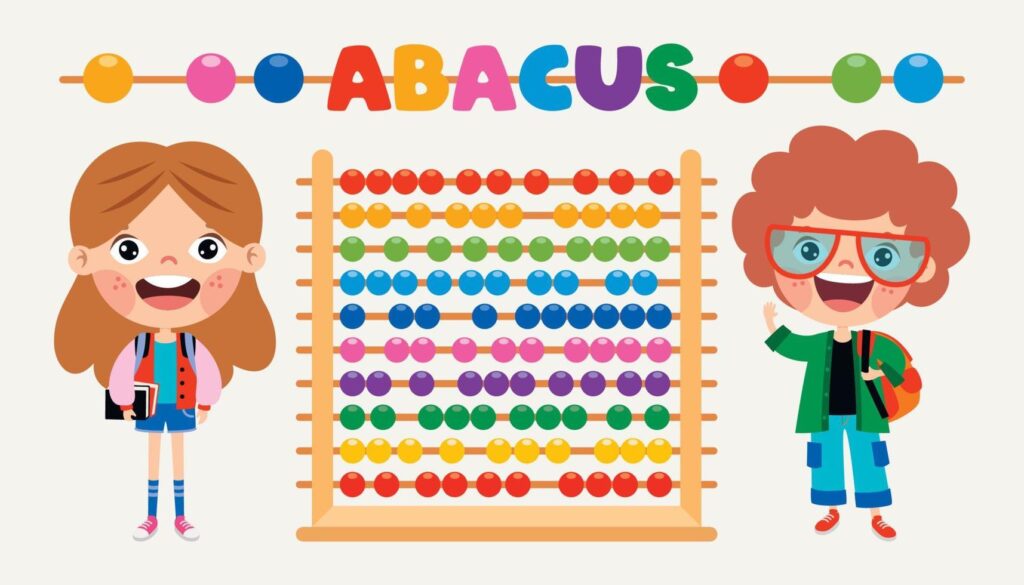The abacus is important for several reason
- Brain Development: Abacus learning plays a crucial role in molding a fully functional brain and developing cognitive skills in children, especially during their growing years. It stimulates brain activities and promotes mental agility [1].
- Mathematical Skills: The abacus is a manual tool that can perform basic mathematical functions and calculations. It is commonly used for teaching arithmetic, especially multiplication. It helps children develop a strong foundation in mathematics and improves their calculation abilities .
- Stress Reduction: Abacus learning has been known to reduce stress levels in children. The mental stimulation provided by using the abacus can help alleviate anxiety and promote relaxation .
- Visual Impairments: The abacus is often used as a substitute for calculators for individuals with visual impairments. Its tactile nature allows visually impaired individuals to perform calculations independently .
- Historical Significance: The abacus has been in use for over 4,000 years and is one of the oldest counting devices. It holds cultural and historical significance and is still widely used in various fields, including accounting, education, and military settings .

1. It Improves Concentration
While the child learns how to use an abacus and carry out simple mathematical operations, the child is also learning to drown out any distraction around them. Once they have mastered abacus use, they then move on to a simple visualization technique that helps them assume the Abacus in their mind and carry out calculations virtually. This, in turn, further boosts their concentration skills even more. These skills get carried forward to other walks of life, and the child can easily focus on anything that comes their way, be it in school or at home.
2. Improves Observation and Listening Skills
With the help of flashcard training, one of the mental training techniques, and while solving mental math problems, a child who has been learning Abacus for math can start processing numbers with just one glance. As the training continues, the child hones their observational skills. Similarly, the listening skills also get better as the kids are trained to hear the numbers only once while solving the problems. This teaches the kids to actively listen to the questions and improve their listening skills in life.
3. Enhances Visualization and Imagination
Very early in their training, kids are encouraged to use a virtual abacus. This helps them quickly solve problems by just imagining an abacus. The more the kid starts using this technique, the better their imagination and visualization skills get.
4. Memory Strengthening as one of the Benefits of Abacus
A child has to memorize several images during their number training and while solving problems. Students who are learning Abacus also tend to remember the final image constructed while solving the problem before giving the last answer. By continuous practice, a child’s ability to memorize something they see improves and can even lead to it becoming a photographic memory.

5. Amplify Speed and Accuracy
Most competitive exams are a time crunch, and the child, although grown, needs to be able to give accurate results in a shorter time. Learning Abacus can help teach a child how to optimize their time as well as staying accurate.
6. Boosts Creativity
Because they have good visualization and imagination skills, the child’s brain has the right training and activation, which inspires the child to be more creative.
7. Increases Self-Confidence
A child who learns Abacus is continually receiving positive feedback from their teachers, parents, and peers. They are also usually exposed to many programs that have different audiences, especially if they take part in demonstrations, national and international competitions. With improved mental abilities, these kids get a powerful boost for their self-image and confidence. This also helps them be more confidant in future challenges.
8. Reduces Stress
The Abacus is known to help stimulate brain activities, which usually leads to a break in anxiety levels. The more the child starts to enjoy using the Abacus, the happier they are while reducing stress levels to almost nonexistent.
9. Strong Academic Foundation
All of the above parameters get firmly embedded into the child’s psyche. This lays a strong foundation for them to excel in their academics.
10. Enhances Gross Motor Skills
The child has to use their hands and fingers to move the beads of the Abacus. Although younger children benefit more from this than they do when they get older, the movement of the small beads helps the child develop their gross motor skills. While the Abacus is improving brain function, one of the major benefits of abacus helping to stimulate sensory organs that result in overall development for the child.

11. Analytical skills, One of the Major Benefits of Abacus
When a child is solving a mathematical problem with an abacus’s help, they are also honing their analytical skills. A great example of this is when they learn to solve the same problem with several simple formulas. The child automatically learns to figure out which is the right formula to use, which helps them build analytical skills. These skills get carried forward, and they can use them in real-life situations.
The sheer number of benefits that the child gains when learning to use an abacus has been a popular extracurricular activity. With its rising popularity, most schools have also started to introduce abacus training in their regular classes.
If you are wondering what the right age for learning Abacus is, your child can start classes as early as 4 years. At this age, the child’s brain processes information the right way, and they have a better understanding of how to use the beads and get their solution right. However, it is never too late for a child to learn a new skill, and this one is definitely worth learning at any age due to the numerous benefits of abacus.
